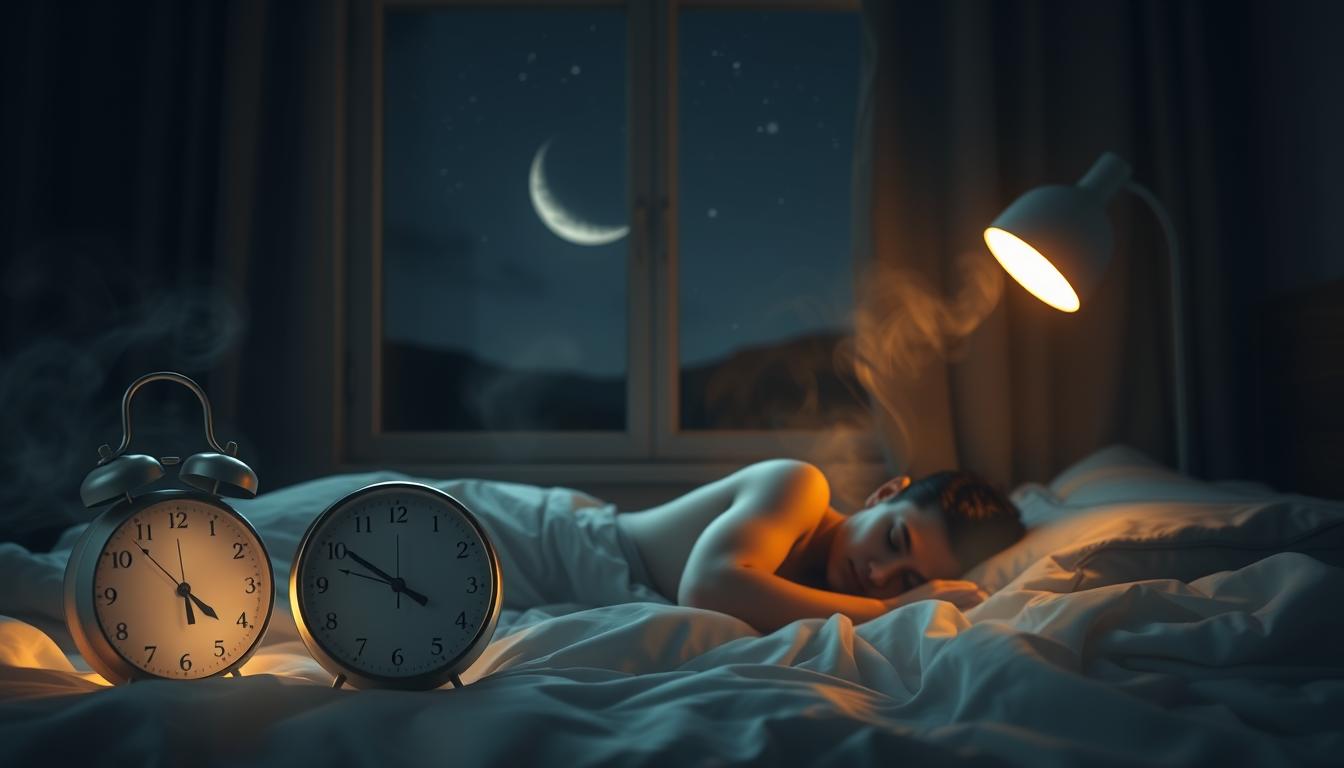It’s important to understand how our circadian rhythm and emotional well-being are connected. Our internal body clock is key to managing our mood. How well it’s aligned can greatly affect our feelings and daily life.
This article will dive into the connection between mood regulation and the circadian clock. It aims to help you find emotional balance.
The Science Behind Circadian Rhythms
Circadian rhythms control our physical, mental, and behavioral changes over a 24-hour cycle. They are influenced by light and temperature. Understanding these rhythms helps us see their role in our sleep, biological clock, and hormonal balance.
What are Circadian Rhythms?
Circadian rhythms are our body’s internal clock. They align our body’s functions with the day-night cycle. This helps us know when to sleep, eat, and produce hormones. Keeping this rhythm is key for our health, as problems can cause many issues.
How Circadian Rhythms Regulate Biological Processes
These rhythms control many body functions. They help us know when to be awake or sleep. They also manage hormone levels, like melatonin and cortisol, which are important for sleep and stress.
When our circadian rhythms are in sync, our body works best. This leads to better health and well-being.
Understanding Mood Regulation
Mood regulation is a complex process that involves many parts working together. At its heart are neurotransmitters, which are key to how we feel and react. They help us manage our emotions.
Components of Mood Regulation
Several elements help with mood regulation. These include physical, mental, and environmental factors:
- Neurotransmitters: These brain chemicals, like serotonin and dopamine, are crucial. They help us feel happy and calm, keeping our emotions stable.
- Neural Circuitry: Certain brain areas and pathways help process emotions. This helps with mood regulation.
- Hormonal Influence: Hormones like cortisol and melatonin impact our mood. They work with our body’s systems, including our sleep cycle.
Mood Stabilizers: Natural vs. Medicinal
There are different ways to stabilize mood, each with its own benefits and considerations:
| Approach | Methods | Effectiveness |
|---|---|---|
| Natural | Diet, Exercise, Meditation | Can improve emotional well-being by promoting the release of endorphins and balancing neurotransmitters naturally. |
| Medicinal | Antidepressants, Mood Stabilizers | Effective for managing severe mood disorders by directly altering neurotransmitter levels, though potential side effects need consideration. |
Using both natural and medicinal methods can often work best. But, it’s important to talk to healthcare professionals. They can help create a plan that fits your needs for better emotional health.
The Connection Between Mood and the Sleep-Wake Cycle
It’s important to understand how mood and sleep are connected. Our mental health improves when our sleep and wake cycles are in sync. But, when they’re not, it can lead to mood problems and other mental health issues.
Impact of Sleep Quality on Emotional Well-being
Good sleep is key to feeling emotionally stable. Poor sleep can make us feel irritable, anxious, and can even lead to mood disorders. When we don’t sleep well, we struggle to control our emotions.
This struggle can make mental health problems worse. It creates a cycle where bad sleep causes emotional issues, which then makes sleep worse.
Tips for Improving Sleep Hygiene
Improving sleep hygiene is vital for better mood and less sleep trouble. Here are some tips backed by science:
- Stick to a regular sleep schedule, even on weekends.
- Make your sleep area dark, quiet, and cool.
- Stay away from caffeine and big meals before bed.
- Do something relaxing before bed, like reading or meditating.
- Don’t look at screens with blue light for at least an hour before bed.
Following these tips can help you have a healthier sleep cycle. This supports both your mental health and mood.
| Sleep Hygiene Practice | Effect on Mood |
|---|---|
| Consistent Sleep-Wake Schedule | Stabilizes mood by aligning circadian rhythms |
| Restful Sleep Environment | Reduces sleep disturbances and improves emotional balance |
| Avoiding Caffeine and Heavy Meals | Prevents sleep disruption, fostering better mood regulation |
| Relaxing Pre-sleep Routine | Decreases stress levels, promoting calmness |
| Limiting Blue Light Exposure | Supports natural melatonin production for better sleep |
Effects of Disrupted Circadian Rhythms on Mental Health
Circadian misalignment, or disruptions in our body’s internal clock, is linked to mental health problems like depression and anxiety. When our internal clock is off, mood swings and emotional ups and downs can get worse. Studies show that circadian misalignment makes depression and anxiety symptoms harder to handle.

A Harvard Medical School study found that people with circadian misalignment are more likely to get depressed. This is because hormones like cortisol and melatonin, which control mood, are not released evenly. Also, anxiety can increase when sleep patterns are not regular, showing how crucial a stable circadian rhythm is.
Not only can circadian rhythm disturbances trigger mental health issues, but they can also make existing problems worse. For example, people with bipolar disorder often experience more extreme mood swings when their sleep patterns are not consistent. They might greatly benefit from efforts to align their circadian clocks.
To better understand the link between circadian misalignment and mental health, look at the table below. It summarizes recent research findings:
| Mental Health Condition | Impact of Circadian Misalignment | Key Hormones Involved |
|---|---|---|
| Depression | Increased severity of symptoms | Cortisol, Melatonin |
| Anxiety | Heightened anxiety levels | Melatonin, Serotonin |
| Bipolar Disorder | More frequent mood swings | Circadian Genes |
The impact of disrupted circadian rhythms on mental health is deep and complex. By fixing circadian misalignment, we can improve our mental health and overall well-being.
The Role of Biological Clock in Mood Stability
Our biological clock and mood stability are closely linked. This is due to the control of hormones like serotonin and cortisol. Knowing how they work together is key to feeling balanced all day.
How the Biological Clock Affects Hormone Levels
The biological clock, or circadian rhythm, helps our hormones work right. Cortisol levels go up in the morning to wake us. They then drop to help us relax and sleep.
Serotonin levels, on the other hand, rise with daylight. They help us feel happy and well. But, if our timing gets off, our mood can suffer.
The Relationship Between Hormones and Mood
Hormones and our mood are closely tied to our circadian clock. For example, if cortisol levels are off, we might feel stressed or anxious. But, steady levels help us stay calm.
Serotonin, known as the “feel-good” hormone, is crucial for mood. Low levels can cause mood swings and depression. So, keeping our circadian rhythm in check is essential for emotional health.
Mood Disorders and Circadian Rhythm Disturbances
Seasonal Affective Disorder (SAD) is a common mood disorder linked to the body’s internal clock. When winter comes, less sunlight affects our mood. This can lead to mood problems.
The body’s natural rhythm is key for feeling good and sleeping right. When this rhythm is off, it can cause feelings of sadness, worry, and tiredness. These are signs of Seasonal Affective Disorder (SAD).

Studies show that fixing the body’s internal clock can help with mood issues. Light therapy can reset this rhythm, improving mood. Keeping a regular sleep schedule and getting natural light also helps.
Daily Rhythms and Emotional Regulation
Understanding how our daily rhythms affect emotional regulation can greatly improve our well-being. By looking into factors like chronotype, we can adjust our routines for better mood and productivity.
Chronotype and Its Influence on Mood
Chronotype is about our natural preference for activities at certain times. Some are night owls, while others are early birds. Knowing your chronotype can help make your day better for emotional control. Night owls might feel more creative and alert at night. Early birds might find their mood and focus better in the morning.
Strategies for Daytime Mood Management
Managing your mood all day needs attention to your chronotype and daily rhythms. Here are some good strategies:
–
- Morning Routines: Begin with light exercise and a balanced breakfast to boost energy and mood.
- Midday Breaks: Take short, regular breaks to avoid burnout; try a quick walk or mindfulness exercise.
- Afternoon Refocus: Do stimulating activities if you feel your energy drop; this helps keep your emotions in check.
- Evening Wind Down: Slow down on activities that stimulate you as bedtime approaches to improve sleep quality.
| Chronotype | Peak Mood Time | Suggested Activities |
|---|---|---|
| Early Bird | Morning | Creative tasks, important meetings |
| Night Owl | Evening | Brainstorming, project work |
By matching your activities with your natural daily rhythms, you can better regulate your emotions and overall well-being. Using these strategies can help keep your mood stable and boost productivity all day.
Integrating Mood Regulation and Circadian Clock for Emotional Well-being
To improve your emotional health, you need to balance mood regulation and a good circadian rhythm. This balance comes from making lifestyle changes that boost emotional strength and stability.
Practical Tips for Balancing Your Emotional Health
Start your day by getting outside or sitting by a window. This helps your body clock stay in sync. Regular exercise also lifts your mood and helps you sleep better.
Mindfulness, like meditation and deep breathing, can make you feel more relaxed and emotionally strong.

The Role of Routine in Mood and Stability
Having a regular routine is key to emotional stability. Keeping the same sleep and wake times improves your mood and health. Add consistent meal times, exercise, and downtime to your day.
These habits strengthen your emotional resilience and help your body clock stay in sync.
Benefits of Synchronizing Your Circadian Clock
When your circadian clock is in sync, you enjoy many benefits. A well-tuned internal clock makes your thoughts clearer and decisions easier. It also reduces stress by balancing hormones.
A well-tuned clock also boosts your mood. You feel less moody and more emotionally balanced. This leads to better mental health.
But there’s more. A regulated internal clock also improves your immune system and lowers disease risk. Here’s why it matters:
| Benefit | Explanation |
|---|---|
| Improved Mental Clarity | Sharper thoughts and more efficient decision-making processes due to a well-regulated internal clock. |
| Reduced Stress | A regulated sleep cycle promotes a healthier balance of hormones, leading to decreased stress levels. |
| Enhanced Mood | Fewer mood swings and a more balanced emotional state resulting from synchronized circadian rhythms. |
| Better Immune Function | A well-regulated internal clock contributes to a stronger immune system and improved overall health. |
| Reduced Risk of Chronic Diseases | Maintaining a synchronized circadian rhythm lowers the risk of developing chronic conditions. |
Common Myths About Circadian Rhythms and Mood
Let’s debunk some myths about circadian rhythms and mood. Many think everyone’s internal clock runs on the same 24-hour cycle. But, people have different chronotypes that affect when they’re most awake and sleep. Knowing your chronotype is key to managing your mood and sleep.
Another myth is that only night shift workers have disrupted circadian rhythms. But, our modern lifestyle, with its artificial lights and screens, affects everyone’s clock. This can lead to sleep myths, like thinking less sleep won’t hurt your mood. But, quality sleep is crucial for emotional health, and not getting enough can worsen mood disorders.
Lastly, some believe mood control is all about mental factors, ignoring the role of circadian rhythms. Circadian rhythms are important for hormone balance and mood stability. By understanding the science, you can make choices that help your sleep and mood. Using strategies like regular sleep and knowing your chronotype can improve your overall well-being.

